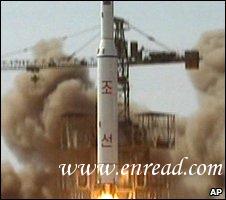| ||||||||||||||||||||||||||||||||||||||||
|
The UN Security Council has condemned1 recent missile tests by North Korea, calling them a threat to regional and international security. 联合国安理会谴责朝鲜近日来的核试验,认为这是对地区安全和国际安全的威胁。 Image released in April of a North Korean missile launch The council's Ugandan president said the firing of seven missiles on Saturday - US Independence Day - violated three existing resolutions. UN sanctions(制裁) ban North Korea from all ballistic(弹道的) missile-related activities. The sanctions were strengthened after Pyongyang carried out a second underground nuclear test in May. North Korea is now banned from exporting all weapons and importing all but small arms. Under the terms, North Korean ships are also liable for(对……负责任) inspection2. The missile launches on Saturday were apparently3 timed to coincide with Independence Day in the United States - a similar volley was fired on the same day in 2006. Saturday's seven Scud-type ballistic missiles had a range of about 500km (312 miles). The missiles fell into the Sea of Japan, known in South Korea as the East Sea. Both South Korea and Japan called the launches an "act of provocation(激怒,刺激)". On Monday the US chief of naval4(海军的) operations, Adm Gary Roughead, said the launches were "very unhelpful". Ties between North Korea and the outside world have grown extremely tense since it walked away from six-nation talks aimed at ending its nuclear programme. It subsequently(后来,随后) said it would "weaponise" its plutonium(钚) stocks and start enriching uranium, prompting fears that it is working to produce nuclear warheads(核弹头) small enough to put on missiles - though analysts5 say it could take a long time to do so. 点击  收听单词发音 收听单词发音
|
||||||||||||||||||||||||||||||||||||||||
- 发表评论
-
- 最新评论 进入详细评论页>>




